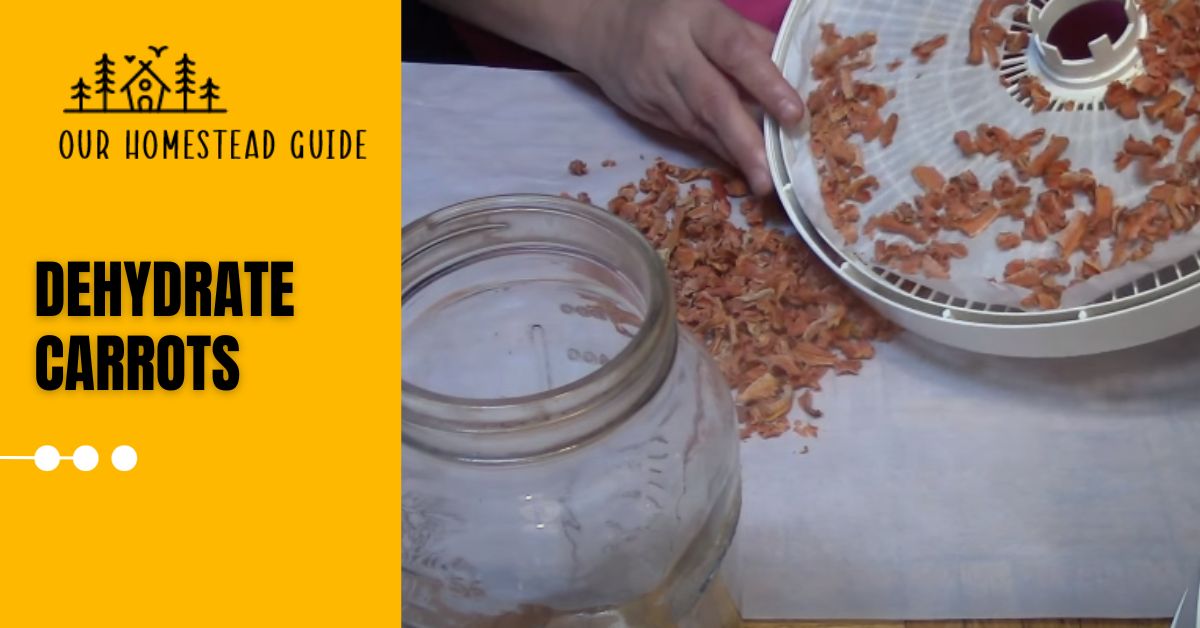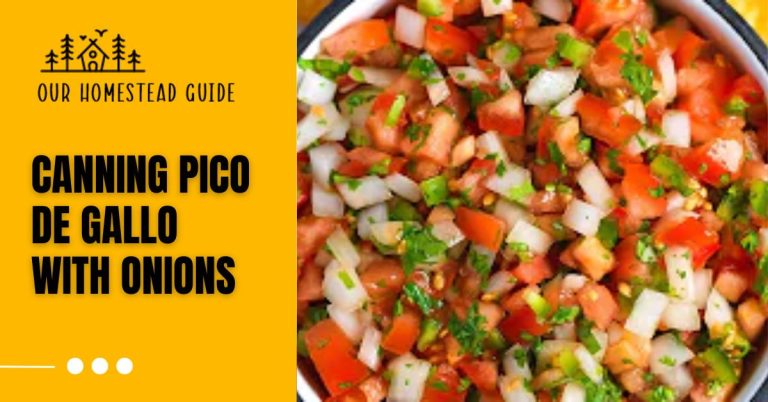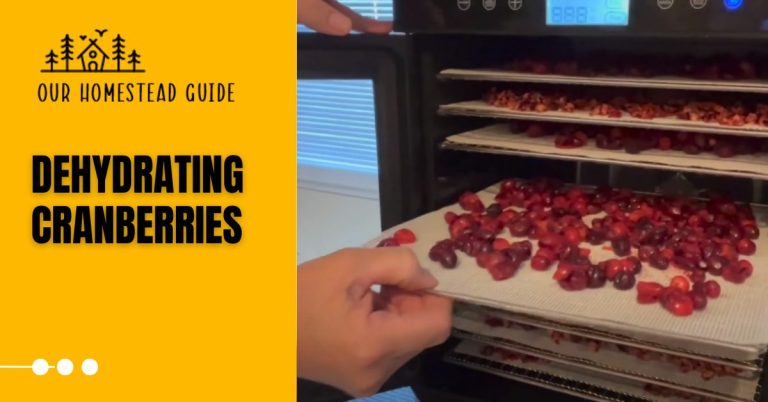How to Dehydrate Carrots – Easy Procedure
Dehydrate Carrots is a simple and effective way to preserve their goodness for long-term use. Various methods and equipment can be utilized for this purpose. If you have an air fryer, start by peeling and slicing the carrots into thin pieces. Arrange them on the air fryer tray and set the temperature to the lowest setting, around 130-140°F (55-60°C). Allow the carrots to dehydrate for several hours until they become crispy.
Alternatively, using a food dehydrator is a popular choice. Slice the carrots and place them on the dehydrator trays. Set the dehydrator to a low temperature, usually around 125-135°F (50-55°C), and let it run for 6 to 12 hours until the carrots are fully dried. For those without a dehydrator, microwave drying is an option. Slice the carrots thinly and place them on a microwave-safe plate.
Dehydrate:
Dehydration is the process of taking water out of a thing. It is a widely used method of food preservation that increases the shelf life of an item and facilitates storage and transportation.
Dehydration is also employed in industrial procedures to remove moisture from materials, medical applications to treat severe cases of fluid loss, and scientific research to examine the impact of water loss on different species.
Dehydrate Carrots Recipes and Uses:
Dehydrated carrots offer a versatile and flavorful addition to various recipes and can be used in a variety of ways. Here are some delectable recipes and uses for dehydrated carrots:
- Dehydrated Carrots and Celery Soup:
Rehydrate the dehydrated carrots and celery by soaking them in warm water. Once they are soft, use them to make a delicious and nutritious vegetable soup.
- Air Fryer Dehydrated Carrot Chips:
Create crispy and healthy carrot chips using the air fryer. Slice the dehydrated carrots into thin rounds, lightly spray them with oil, and air fry them until they turn golden and crispy.
- Dehydrated Carrot Bacon Bits:
Finely crumble the dehydrated carrot bacon to create a plant-based alternative to bacon bits. Sprinkle them over salads, soups, or baked dishes for a smoky flavor.
- Dehydrated Carrot Chips for Dogs:
Treat your furry friends with homemade dehydrated carrot chips. Slice the carrots thinly and dehydrate them until crunchy, providing a nutritious and tasty snack for your pets.
- Dehydrated Carrot Cake:
Incorporate dehydrated carrots into your carrot cake recipe. Grind the dehydrated carrots into a fine powder and mix it into the cake batter for added carrot flavor and nutrients.
- Dehydrated Carrot Crackers:
Blend the dehydrated carrots into a powder and combine it with flour, herbs, and spices to make delicious and healthy carrot-flavored crackers.
- Dehydrated Carrot Dog Treats:
Make wholesome and natural dog treats using dehydrated carrots. Mix ground dehydrated carrots with dog-friendly ingredients and bake them into crunchy treats.
- Dehydrated Carrots for Rabbit Food:
Rehydrate the dehydrated carrots and mix them with fresh vegetables to create a balanced and nutritious meal for pet rabbits.
Table of Variations:
| Recipe / Use | Instructions |
| Dehydrated Carrots and Celery Soup | Rehydrate and use in vegetable soup |
| Air Fryer Dehydrated Carrot Chips | Slice, oil, and air fry until crispy |
| Dehydrated Carrot Bacon Bits | Crumble and use as plant-based bacon bits |
| Dehydrated Carrot Chips for Dogs | Slice and dehydrate for canine snacks |
| Dehydrated Carrot Cake | Grind and mix into carrot cake batter |
| Dehydrated Carrot Crackers | Blend into powder and make crackers |
| Dehydrated Carrot Dog Treats | Mix with other ingredients and bake dog treats |
| Dehydrated Carrots for Rabbit Food | Rehydrate and mix with fresh vegetables for rabbit food |
Experimenting with dehydrated carrots in various recipes can add a nutritious twist to your meals and snacks while reducing food waste. Enjoy the natural sweetness and vibrant flavor of dehydrated carrots in your culinary creations.
General Dehydrating Information:
- Dehydrating peas and carrots is a simple process that involves slicing or dicing the vegetables, arranging them on dehydrator trays, and drying them at a low temperature until they are fully dehydrated.
- When dehydrating frozen peas and carrots, it is essential to thaw them before slicing and dehydrating to ensure even drying.
- Dehydrating carrots and celery requires slicing the vegetables into uniform pieces and placing them on dehydrator trays, adjusting the drying time depending on their thickness.
- To dehydrate carrots using a dehydrator, slice them into desired shapes, such as rounds or strips, and set the dehydrator to a low temperature, typically between 125-135°F (50-55°C).
- For dehydrating baby carrots, wash and peel them if desired, and then follow the same process as regular carrots, adjusting the drying time for smaller pieces.
- To preserve dehydrated carrots for long-term storage, store them in airtight containers or vacuum-sealed bags in a cool, dark place to maintain their quality and flavor.
- When dehydrating grated carrots, spread them evenly on dehydrator trays to ensure uniform drying, and use a lower temperature to prevent clumping.
- For sliced carrots, arrange them in a single layer on dehydrator trays to promote efficient drying and maintain a consistent texture.
- Dehydrating shredded carrots requires spreading them thinly and evenly on dehydrator trays, ensuring they are not too compact to allow for proper airflow during drying.
- Dehydrating whole carrots is possible, but it requires more time and may result in uneven drying. Slicing or chopping carrots before dehydrating is generally more efficient and yields better results.
General Carrot Dehydration Questions:
- Can you dehydrate carrots in an air fryer? Yes, you can dehydrate carrots in an air fryer by slicing them thinly and setting the temperature to the lowest setting. It may take several hours to achieve the desired level of dehydration.
- Can you dehydrate carrots without blanching? Yes, you can dehydrate carrots without blanching. While blanching can help retain color and nutrients, it is not necessary for successful dehydration.
- Can you dehydrate carrots in the oven? Yes, you can dehydrate carrots in the oven. Slice the carrots into thin pieces, place them on a baking sheet, and set the oven to the lowest temperature, propping the oven door open slightly for proper airflow.
- Can you dehydrate carrots for dog treats? Yes, dehydrated carrots make healthy and natural dog treats. Slice or dice the carrots and dehydrate them until they become crunchy and safe for canine consumption.
- Can I dehydrate carrots in the oven? Yes, you can dehydrate carrots in the oven. Use the lowest temperature setting and be patient as it may take several hours to fully dehydrate them.
- Can I dehydrate carrots in the microwave? Yes, you can dehydrate carrots in the microwave by slicing them thinly and microwaving them in short bursts until they are dried and crispy.
- Can you dehydrate carrots in the microwave? Yes, you can dehydrate carrots in the microwave. Slice them thinly, place them on a microwave-safe plate, and microwave them in short intervals until they are fully dehydrated.
- Can you dehydrate raw carrots? Yes, you can dehydrate raw carrots. Slice, dice, or shred them before dehydrating to speed up the process and ensure even drying.
- Can you dehydrate frozen carrots? Yes, you can dehydrate frozen carrots. Thaw them before slicing and dehydrating to ensure even drying.
- Can I dehydrate carrots? Yes, you can dehydrate carrots using various methods such as a dehydrator, oven, air fryer, or microwave.
- Are dehydrated carrots good for dogs? Yes, dehydrated carrots can be a healthy and tasty treat for dogs, providing essential nutrients and a satisfying crunch.
- Are dehydrated carrots good? Yes, dehydrated carrots retain most of their nutrients and natural sweetness, making them a nutritious and convenient snack.
- Are dehydrated carrots good for you? Yes, dehydrated carrots can be good for you as they contain vitamins, minerals, and fiber, offering a healthy alternative to processed snacks.
Nutritional and Health Aspects of Dehydrated Carrots:
Dehydrated carrots pack a nutritional punch, making them a healthy and convenient option for snacking and culinary uses. One of the benefits of dehydrated carrots is their concentration of nutrients, as they retain much of their vitamins and minerals during the drying process. While the calorie content of dehydrated carrots is relatively low, they offer essential nutrients like vitamin A, vitamin K, potassium, and dietary fiber.
These nutrients support vision, bone health, and overall well-being. Additionally, dehydrated carrots can be a wholesome treat for dogs, providing a crunchy snack rich in vitamins and minerals. However, moderation is key, as the drying process may concentrate natural sugars. Overall, when consumed as part of a balanced diet, dehydrated carrots can be a nutritious and delicious addition to one’s daily food intake.
Tips and Tricks for Miscellaneous and Foreign Language Keywords:
- Dehydrate Carrots and Deshydrater carotte: These are French phrases that mean “dehydrate carrots” and “dehydrate carrot,” respectively. If you come across foreign language terms, use translation tools to understand their meaning and context.
- J’hydrate and Rehydrate carottes: These French phrases mean “I hydrate” and “rehydrate carrots,” respectively. Rehydrating dried carrots is simple; just soak them in water until they become soft and plump again.
- Dehydrate carrots Xbox and Dehydrate carrots YouTube: Be cautious with search results containing “Xbox” or “YouTube” as these terms are unrelated to the dehydrating process. Focus on relevant sources for proper information.
- Dehydrate carrots zucchini: Mixing carrots with zucchini before dehydrating can create unique and flavorful vegetable chips. Slice both vegetables thinly and dehydrate them together for a delightful snack.
- Dehydrate carrots 2023 and Dehydrate carrots 1kg: These are likely references to specific quantities or time frames for dehydrating carrots. Always adjust your dehydrating time based on the thickness of the slices and your equipment.
- Carrot 3 and 5orchef: These terms might be related to specific carrot varieties or brand names. Ensure proper research and verify the source before making any purchasing decisions.
- 5-5-5 Carrefour: This could be a reference to a product or recipe with specific proportions. Double-check the context to understand its relevance.
Dehydrated Carrot Chips Use
Dehydrate Carrot Chips”: These are thin, crisp snacks made by removing moisture from carrot slices through the dehydration process.
“How to Use Dehydrated Carrots”: Dehydrated carrots can be rehydrated for soups, stews, or snacks. They can also be ground into powder for adding flavor and nutrients to dishes.
“How Long Do Dehydrated Carrots Last”: Properly stored in an airtight container, dehydrated carrots can last around 6 to 12 months. Vacuum-sealing extends their shelf life further.
“Dehydrated Carrots for Dogs”: Dehydrated carrots can serve as a healthy dog treat. They’re low in calories and provide vitamins. Always ensure the treats are appropriate for your dog’s dietary needs.
“Where to Buy Dehydrated Carrots”: Dehydrated carrots can be found in specialty stores, online retailers, or you can make them at home using a dehydrator.
“Dehydrating Carrots Without Blanching”: While blanching can help retain color and nutrients, you can dehydrate carrots without blanching. However, expect slightly altered color and nutrient loss.
“Dehydrated Carrots and Celery”: Combining dehydrated carrots and celery makes a tasty and crunchy snack mix, trail mix, or soup ingredient.
Most Frequently Asked Questions!
Q1: What are dehydrated carrot chips?
Dehydrated carrot chips are thin, crispy slices of carrots that have had their moisture removed through the dehydration process. They make for a convenient and flavorful snack.
Q2: How can I use dehydrated carrots in cooking?
You can rehydrate dehydrated carrots by soaking them in water before using them in soups, stews, and other dishes. They can also be ground into powder for adding carrot flavor to recipes.
Q3: How long do dehydrated carrots last?
When stored in airtight containers in a cool, dry place, dehydrated carrots can last around 6 to 12 months. Vacuum-sealing can extend their shelf life even further.
Q4: Can I give dehydrated carrots to my dogs?
Yes, dehydrated carrots can be a healthy and low-calorie treat for dogs. They are a good source of vitamins and fiber. Just ensure the treats are appropriate for your dog’s dietary needs.
Q5: Where can I buy dehydrated carrots?
You can find dehydrated carrots in specialty food stores, health food stores, and online retailers. Alternatively, you can make them at home using a food dehydrator.
Q6: Can I dehydrate carrots without blanching them first?
Yes, you can dehydrate carrots without blanching, but blanching can help preserve their color and nutrients. Skipping blanching might result in slightly altered color and some nutrient loss.
Q7: Can I combine dehydrated carrots with other vegetables?
Certainly, you can combine dehydrated carrots with other vegetables like celery to create flavorful and crunchy mixes for snacks or as ingredients in various dishes.
Q8: Are dehydrated carrots healthy?
Dehydrated carrots retain much of their nutritional value, including vitamins and fiber. However, since water is removed, they can be higher in sugar and calories compared to fresh carrots. Enjoy them in moderation as part of a balanced diet.
Q9: Can dehydrated carrots be used in baking?
Yes, you can use powdered dehydrated carrots to add flavor and nutrients to baked goods like muffins, bread, or pancakes.
Q10: Can I rehydrate dehydrated carrots quickly?
Yes, you can rehydrate dehydrated carrots by soaking them in warm water for about 15-20 minutes or until they regain their desired texture.
you may also like this article.




